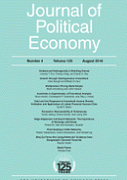This paper examines the extent to which tariff cooperation is observed among World Trade Organization members. With the help of a simple political economy model, we show that tariffs are positively correlated with the importer’s market power when they are set noncooperatively but negatively correlated when set cooperatively. We use this prediction to empirically identify the extent of cooperation in the WTO and find that more than three-quarters of WTO members’ tariffs are set noncooperatively.AcknowledgmentWe are grateful to Kyle Bagwell, Mostafa Beshkar, Eric Bond, Chad Bown, Matthieu Crozet, Anne-Célia Disdier, Giovanni Facchini, Michael Gasiorek, Sajal Lahiri, James Lake, Nuno Limão, Patrick Low, Rod Ludema, Giovanni Maggi, Anna Maria Mayda, Jaime de Melo, Christoph Moser, Marc-Andreas Muendler, Emanuel Ornelas, Thomas Osang, Ralph Ossa, Michele Pellizzari, Fréderic Robert-Nicoud, Santanu Roy, Subhash Sharmaand, José de Sousa, Bob Staiger, Akiko Suwa, Alan Winters, the editor Ali Hortaçsu, three anonymous referees, and seminar participants at Darmouth, ETH Zurich, Getulio Vargas, the Midwest Meetings at the University of Kansas, Oklahoma State, the Research in International Economics and Finance in Orleans, the Society for the Advancement of Economic Theory meetings in Rio, the Paris School of Economics, Southern Illinois University, Southern Methodist University, Sussex University, and Zheijang University for helpful comments and discussions. We are also grateful to Rod Ludema and Ana Maria Mayda for providing us the data set used in their (2013) study. Olarreaga is also grateful to the Swiss National Science Foundation and the French National Research Agency under program ANR-10-LABX-14-01 for their support. The views expressed here are those of the authors and do not necessarily reflect those of the institutions to which they are affiliated.

